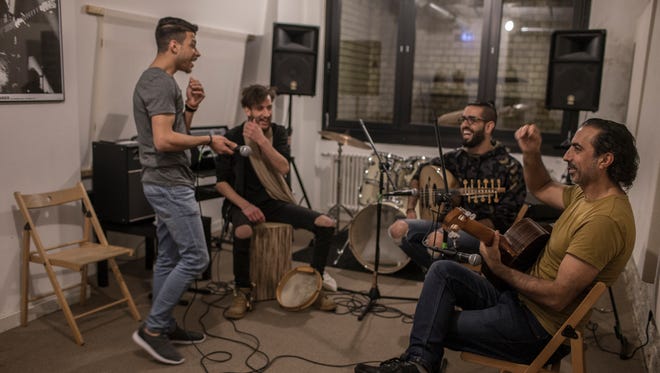Syrian refugee band in Berlin creates 'place with no borders' through music
BERLIN — As the small, overcrowded boat rocked dangerously from side to side, Abdallah Rahhal began to sing the familiar Arabic tunes of his childhood. The fear started to leave him, and he saw his words began to soothe the panicked refugees who surrounded him, as the boat drifted toward Greece in the middle of the Aegean Sea.

“Music helped me to survive. It gave me hope,” the talented Syrian, who sings in the Arabic Tarab style, said in a small café in this trendy German capital, a world away from that treacherous sea crossing and chaos in the war-torn country he fled.
Berlin is also where Rahhal, 28, has made his mark as a member of a band of Syrian refugees that is drawing hundreds of followers as it tours Germany. Amid a growing backlash against the Muslim migrants who have flooded into the country, he and his band have become ambassadors of goodwill forging links of understanding between refugees and native Germans.
“Through music you can show exactly who you are,” Rahhal said. “You can show what you can give, and what you are capable of. Music helps take away any suspicions people may have that you are here to destroy.”
Rahhal's hometown of Aleppo has seen some of the heaviest fighting during the five-year civil war. The city was thrust back into the global spotlight this month when a photo of dazed 5-year-old Omran Dagneesh, covered in dust and blood, went viral.
Boy, dazed and bloodied, becomes the face of Aleppo
“There are so many Omrans in Syria,” said Rahhal, who left many relatives in Aleppo.
From that sea crossing, through every country, port, refugee camp and shelter where Rahhal arrived, he sang to hundreds of other refugees.
“When you create this small world with the music, everything becomes OK,” said Rahhal, who studied at the Sabah Fakhri Institute of Music in Aleppo. “I sang all the way.”
Rahhal was singing to residents in the refugee shelter in Brandenburg, where he was living last fall, when a chance encounter took him to Berlin.
“I had never heard this kind of singing before and then I heard him,” Rachel Clarke, a Scottish theater producer who has lived in Germany for the past two decades, told USA TODAY. “He was performing a cappella in front of all these refugees. It was really amazing. There was so much joy in the room. I felt like the roof was going to come off. At that moment I just thought, he can’t stay here, he has to come to Berlin.”
Clarke asked Rahhal to sing at her sold-out shows across Germany. On that tour, Rahhal came across fellow Syrian musicians, Ali Hasan, Alaa Zaitouna, Bilal Hammour and Adel Sabawi.

“What was amazing for me to see from the outside was that they had one rehearsal, and in half an hour the sound was absolutely beautiful,” Clarke said.
By the start of this year, the Syrian band in exile, Musiqana — meaning "our music" in Arabic — was born, with Clarke as their manager. “It just all clicked together,” said Hasan, the drummer of the band.
Hasan, 26, can’t help but make jokes about the people around him, or suddenly burst into a lyric from a well-known pop song.
He’s serious about Musiqana, though. The band has given Hasan a sense of purpose in Germany, and a chance to integrate into the community.
Musiqana, who recently embarked on a German-wide tour, found that hundreds of locals and refugees were turning up to see them play. In some concerts, more than 90% of the crowd were German nationals.
Their concerts have become a cultural meeting point between Germany’s old and new residents.
“Here is my identity, here is something that I can bring with me to Germany. But really it’s an amazing feeling when you see people are enjoying and dancing, even people that don’t understand any of the words," Hasan said. "For Syrians, it reminds them of home. For Germans, it is something new and they are so open to it. It’s a place with no borders.”
Hasan’s fiancée and parents remain stranded in the mountainous region of Masyaf in Syria. Their safety is always on his mind.
Musiqana has become for Hasan and the other band members a small release from constant worry and an attempt to provide comfort to others in similar positions. The band has also been a place of solace when news of a family death comes.
For Rahhal, the Arabic Tarab music brings back memories of gathering at Aleppo castle, where musicians like himself played together spontaneously at the foot of the ancient citadel. For Hasan, it reminds him of his mother’s cooking when he returned home from school as a child.
“This music provides a good memory of home for us,” Rahhal said.
After their successful German tour, the band has big ambitions for the future. Having piqued the interest of Germans with their distinctive eastern style of music, they now want to embark on a tour of Europe, and eventually the United States.
“L.A. especially,” Hasan said. To make it to the bright lights of the city is the young Syrian's ultimate dream.
But the band doesn't want to promote only their music, they want to promote their country, and refugees in a positive light.
As far-right parties in Europe surge in popularity by condemning Islamist extremism for a recent string of terror attacks, the band members are determined to bring people together with music.
“Musiqana is more than just a band," Rahhal said. "Music has no borders, no nationality, it's just music.”